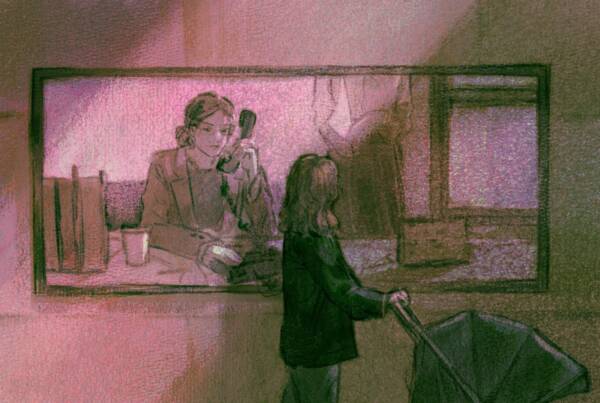Writing by Hannah Cohen // photograph by Milan Popovic
 If you too have been in a relationship where your male partner is constantly, even in jest, referred to as ‘whipped’ by you, their female counterpart, I feel you. It definitely doesn’t feel good, and I sure as hell have never heard a woman being labelled ‘whipped’ by a man she’s dating. Knowing your partner is being berated with whipping gestures by his friends every time he decides to spend a night with you is enough to make my stomach turn.
If you too have been in a relationship where your male partner is constantly, even in jest, referred to as ‘whipped’ by you, their female counterpart, I feel you. It definitely doesn’t feel good, and I sure as hell have never heard a woman being labelled ‘whipped’ by a man she’s dating. Knowing your partner is being berated with whipping gestures by his friends every time he decides to spend a night with you is enough to make my stomach turn.
To me, this outdated term that is still shockingly, getting thrown around when a woman asserts her needs in a relationship, reveals how society is still bound by internalised gender norms that aim to silence women into passive and demure sidekicks to men.
Silly at best, and insulting at worst, the term has always made me shudder. After some research, I’ve come to the conclusion that the term ‘whipped’ is grounded in misogyny and archaic gender roles.
Allow me to explain.
It’s inherently gendered
As I touched on above, women are never considered to be whipped. Behind every ‘whipped’ male partner, is the nagging housewife trope. Because women are bossy. Women are tyrants. Women are controlling fun-suckers. On the flip side, if a woman is exhibiting the same behaviour as a man who has been dubbed by his mates as ‘whipped’, she’s simply committed. A diamond. An incredibly ‘good missus’. Cue the eye-rolls.
When the term whipped gets thrown around, we’re simply affirming the notion that men should have the upper hand in heterosexual relationships. Whether it be asking for more one-on-one time as a couple, watching a TV series together that she chose, or establishing an equal division of the domestic load; when a woman assert her needs or preferences in a relationship, and their male partner gladly listens to her requests, the term ‘whipped’ rears its ugly head to infer that emasculation is afoot.
The impact is two-fold. The use of the term shames men for doing nice things for their partners, boxing them into the ‘beta-male’ stereotype for merely showing up as an equal in the relationship. As a consequence, this normalises men being simultaneously domineering and mediocre in heterosexual partnerships, and subsequently reduces women to ‘the old ball and chain’ – disapproving of women who exercise their right to ask more (or even the bare minimum) of their male partners and encouraging them to shrink into a place where they accept less than they deserve.
By using the term ‘whipped’ we’re implying that women shouldn’t be asking for what they deserve because this emasculates their male partners. Pretty antiquated if you ask me.
It disregards the necessary give and take in relationships
When men are ridiculed for being ‘whipped,’ the concept of relationships requiring open communication and compromise is tossed out the window. Instead of regarding men with respect for practicing effective compromise and communication (as they should) within their relationships, throwing around the term whipped only diminishes the importance of give and take within relationships.
Last time I checked, couples should be mutually aware of each others wants and needs. They should navigate those boundaries together by striving for a healthy balance between showing up for each other and exercising independence.
So, when we jump to calling a man whipped for choosing to follow suit on their female partner’s request, instead of considering it healthy compromise, we assume the man is being dragged into a relationship where he has no voice. Again, the double standard exists in that our ears rarely prick up when the roles are reversed. This is because the term whipped is rooted in the misogynistic gender convention that when a man says ‘jump’ a woman should only ever reply ‘how high?’
It blurs the line between a toxic relationship and a healthy one
Unfortunately, there are literally articles upon articles with variations of the headline ‘10 Signs You’re Whipped’ that caution the use of endearing nicknames, matching outfits, being her best friend, and “phasing out beer and chips with wine and cheese” as signs that a man is being whipped by his female partner. While these articles are absurd, they’re also littered with blatantly sexist language and don’t point out any behaviours that are actually indicative of a toxic relationship.
Of course, there’s a difference between a man feeling as though their partner is controlling every aspect of his life and hijacking any sense of independence, and a relationship dynamic simply deviating from the expectation of men being the primary decision makers. In the instance of the former, we’ve got ourselves a relationship that needs reassessing. However, in my experience, the term ‘whipped’ isn’t usually thrown around when there is need for genuine concern – it’s simply banter.
It’s definitely important to address that it is difficult for men in toxic relationships to reach out for help. Because of those same pesky gender roles that assume the man to be the dominant, stronger voice in the relationship, and the woman to be submissive and obedient, society tells men to simply ‘man up’ when they’re faced with abusive, controlling behaviour in partnerships.
But, the term ‘whipped’ isn’t doing anyone any favours – it’s actually pretty counter productive. When used among men to call out a man’s ‘beta’ behaviour, it’s not a symbol for concern to help a friend in an unhealthy relationship, it’s a means to humiliate and tease.






